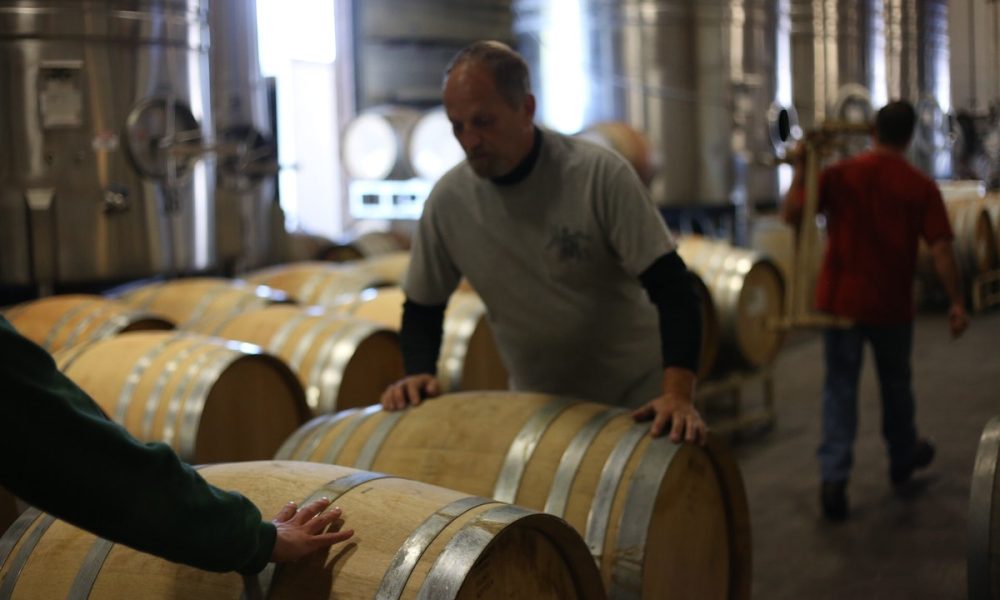 Staff at Willamette Valley Vineyards, based in Turner, move barrels of wine in fall of last year. Winery owner Jim Bernau has been a vocal leader in proposing new legislation to clamp down on out-of-state wineries. (Troy Brynelson/Salem Reporter)
Staff at Willamette Valley Vineyards, based in Turner, move barrels of wine in fall of last year. Winery owner Jim Bernau has been a vocal leader in proposing new legislation to clamp down on out-of-state wineries. (Troy Brynelson/Salem Reporter)
Update: A correction has been appended to this story.
A labeling spat last year between wineries in the Willamette and Napa valleys has led to a slew of proposals in the Oregon Legislature aimed at cracking down on out-of-state competitors, but it also has raised concerns for winemakers and growers in southern Oregon.
The legislation would raise requirements for a wine to claim to be from an Oregon wine region and give the state greater power to punish wineries for mislabeling products.
Willamette Valley Vineyards Co-Founder Jim Bernau said the bills have “widespread industry support” because the state needs thornier protections as its wine reputation grows.
“It’s like Rolex. Why do people make knock off Rolexes? It’s because Rolex has a very powerful brand. That’s what’s happening to Oregon,” he said. “People are starting to recognize Oregon as one of the best places in world to make wine — and that invites fraud.”
Last fall, Bernau led several regional wineries in a campaign against Napa Valley winery Copper Cane Wine & Provisions from using Oregon’s Willamette, Rogue and Umpqua valleys on its wine labels.
The Oregon wineries argued Copper Cane’s wines did not meet state and federal standards to claim those regions, and thus misled buyers.
In November, the U.S. Alcohol and Tobacco Tax and Trade Bureau told Copper Cane to change or surrender nine of its wine labels and the Oregon Liquor Control Commission proposed revoking the winery’s ability to sell in Oregon.
Jim Blumling, Copper Cane vice president of operations, said the Rutherford, Calif.-based winery and the state regulatory agency are currently working to settle the enforcement action.
“They cited us for a number of violations and we met with them on several occasions to talk through this and help them understand the specifics of our situation and we’re working through the settlement proceedings,” he said.
But the new bills, according to Blumling, are “solutions in search of a problem.”
“There’s a large coalition of folks that aren’t in favor of these bills as they’ve been proposed and, regretfully, it would appear there’s a vocal minority that seems to be speaking on behalf of the entire industry, claiming they have broad appeal and support for legislation,” Blumling said. “That does not seem to be the case, based on all of the calls and messages going to senators as we speak.”
Many of the proposals, pending in legislative committees, aim to give Oregon greater authority over wine business conducted on its own turf.
Two proposals raise the standards for a wine label to claim to be from an Oregon wine region unless approved by the OLCC. Those changes are proposed under Senate bills 830 and 831, which the Willamette Valley Wineries Association has championed.
Another proposal, Senate Bill 111, creates an “out-of-state winery” permit to not only sell wine in Oregon but to also buy grapes from Oregon growers. The permit requires more reporting to the state. Bernau said the permit also ensures out-of-state wineries pay a tax when they buy grapes.
“Out-of-state producers, some of them, have been skating on it,” Bernau said.
Under the proposal, Oregon winegrowers couldn’t sell grapes to wineries without a permit. The bill also establishes criteria to deem a label “deceptive,” that the OLCC can punish by revoking the permit. Revocation could effectively cut a winery’s supply.
Senate Bill 111 is supported by the Oregon Winegrowers Association.
John Pratt, president of the Rogue Valley Winegrowers Association, told Salem Reporter there have been rumblings of opposition in southern Oregon where some winegrowers thrive by selling across state lines.
But the 100-member association opposes the other bills that propose raising the requirements for a wine to claim a wine region, calling them restrictive.
“Imposing unnecessarily restrictive regulations necessarily restricts the creativity of the winemaker,” read a letter Pratt wrote to lawmakers. But the 100-member association opposes the other bills that proposing raising the requirements for a wine to claim a wine region, calling them restrictive.
“Imposing unnecessarily restrictive regulations necessarily restricts the creativity of the winemaker,” read a letter Pratt wrote to lawmakers. Pratt added that Oregon’s wines have already succeeded under the current requirements.
On Tuesday, lawmakers were to consider writing a letter to federal delegates calling for stricter federal enforcement of wine regulations. Rep. David Gomberg, D-Otis, co-sponsored that proposal and has long supported Willamette Valley Vineyards.
Blumling, at Copper Cane, said the U.S. Alcohol and Tobacco Tax and Trade Bureau closely watches the industry and echoed the Rogue Valley winegrowers belief that state restrictions are strong.
“I’m not exactly sure why they’re choosing to create further legislation when there’s already guidance that supports some of what they’re already talking about,” he said. “It’s interesting.”
Blumling added that Copper Cane, which bought more than 2,000 tons of Oregon grapes last year, met federal and state standards for the composition of its wines and only surrendered its labels to change the “romance copy.” Vinting and bottling for its Willametter Journal pinot noir starts soon, he said.
When asked if Copper Cane would continue to buy Oregon grapes if required to buy an out-of-state winery permit, Blumling said he couldn’t say. He said the cadre of bills, however, would change its wines.
“Once the rules change, we’ll talk about what we’re going to do. It’s only in the best interest of a few purists that want to gravitate toward some higher standard for some unknown reason,” he said. “What we know is the standard by which they’re looking to aspire is not driven by the consumer.”
Correction, March 23: An earlier version of this article misrepresented the Rogue Valley Winegrowers Association’s opposition. Its points have been clarified.
Have a tip? Contact reporter Troy Brynelson at 503-575-9930, [email protected] or @TroyWB.









